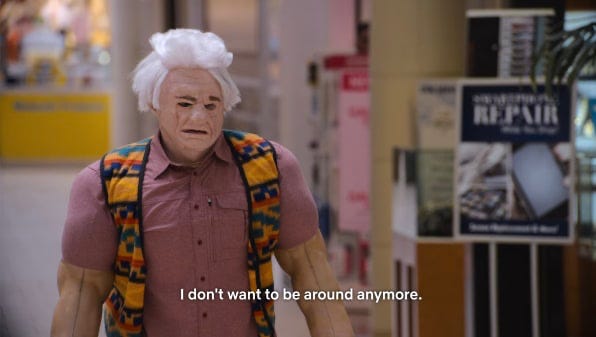Pick your crisis: there’s climate change, mental health, a loneliness epidemic, unprecedented income inequality, the threat of artificial intelligence takeover. Not to mention the fact that we just recently got out of a pandemic.
Aptly positioned next to a photo of the devastating Canadian forest fires, the The New York Times published an article in the Sunday edition back in June plainly stating that “Failures of Globalization Shatter Long-Held Beliefs,” citing the myriad crises previously listed as strong indicators of a failing global economic system. We’re becoming keenly aware that things are not working.
Maybe the silent generation felt this way going through the great depression followed by World War II, but it seems like today there’s a lot more to worry about (also, meme culture didn’t exist as a vehicle for self expression of existential dread). The majority of Americans seem to agree. A survey by Pew Research Center found that roughly six-in-ten (58%) of Americans say that life for people like them is worse today than it was 50 years ago.
The kids are also not alright. Vice asked kids what they thought 2050 would be like and the answers were somewhat…harrowing. “Well, I heard that if we don’t save the earth in a few years, it’ll be too late. So when I’m 30, I don’t think I’ll be here anymore,” said one 10 year old. When asked “what are you afraid of?” 9 year old Jeanne said “well… that the world will die.”
Nihilism has long been growing amongst Gen Z, and with it a unique sense of existentialism. As crises intensify with little relief in sight, and traditional religious belief systems decline in importance, young people are coping in interesting ways — some lean into the darkness, while others find freedom and liberation in the madness.
On social media, this takes the form of “humancore.” We’ve gone from cluttercore, to corecore, to now humancore — observing ourselves from a distance. The recent TikTok trend refers to videos documenting everyday humanity: kissing a loved one in the street, singing karaoke at a bar, playing soccer in the park. Just humans being humans! I spoke with humancore creator Enya Hennings (@agalleryoflife) about the significance of this trend not just within the social media landscape, but also what it means for society at large:
Perhaps #humancore signifies a collective departure from the self-oriented spectacle social media hinges on, to something external... coping could exist in the “camera flip” button. As “#humancore” contributors, we deflect the observation to others to be observed, we reject the idea that we need to be doing something notable to take note. The entire act of #humancore is to reorient how social media currently deals with self.
There is, of course, a natural tension that arises from this…the dissociative nature of the format versus how we use it as an attempt to reengage with the humanity that we’re surrounded by, and maybe perhaps it’s all in vain.
Objectively it’s cute and romantic — representing a shift towards more authentic, pure and intimate content. But it also represents a dissociation of sorts. Ironically, in our attempts to reconnect with humanity we may be detaching ourselves even more. Looking at ourselves from the outside in. Maybe in a way that another species (i.e. aliens?!?) might be.
Speaking of which, the Department of Defense released an official report this summer acknowledging the existence of UFOs. The cultural discourse is decidedly…dispassionate. TikTok creator RaeShanda Lias-Lockhart sums it up perfectly: “Do you know how bad it has to be in the economy for nobody to be talking about aliens? If they’re not helping us out with student debt, or going half on this rent, we don’t care.”
If dissociation isn’t your vibe, distraction is another vehicle by which you can avoid your existential dread. This scientific study from 2014, recently resurfaced by
, really captures this aggressive avoidance: People would rather be electrically shocked than left alone with their thoughts. In response to the study, researchers suggested that “meditation or other techniques to relax and learn how to gain control of the mind could be helpful. If we knew how to steer our thoughts in a pleasant direction and enjoy the experience, maybe we wouldn't hate to be alone with ourselves.”No luck there. Data from Apptopia, disclosed by
reveals a staggering downturn in the top 10 meditation apps since January 2021. Downloads have plummeted by 75%, and user sessions have fallen by 61%. Perhaps the market has become oversaturated. But also, maybe people are tired of being alone with their thoughts?Sludge content might be a way around that. For some, the abject chaos of four videos playing simultaneously is comfort by way of distraction. Inundating your conscious and subconscious with so much content, it’s nearly impossible to produce an original thought.
Existential avoidance also takes shape in the life decisions many people are making. With younger generations unable to reach traditional milestones, alternative lifestyles are popping up — partially as a joke, but also an acknowledgment of the immense difficulties faced in taking care of children, let alone yourself, in 2023. In China, many young people are choosing to “raise” stuffed IKEA monkeys instead of having children. In an economy hampered by rising living costs, long working hours (such as ‘996’), and high unemployment rates, stuffed monkeys are a powerful emotional salve.
“Who’s going to take care of you when you’re old, if you don’t have children?” reads a popular meme. “My monkey child,” it answers.
Sometimes there’s nothing else to do but confront the abject darkness surrounding us all. But ya know, be light about it. While dark humor has long been an indicator of Gen Z ethos, Tim Robinson’s I Think You Should Leave perfectly captures this evolution of absurdity in the current zeitgeist. Season 2’s Prank Show sketch starts off as a jovial Robinson dresses up in a terrible yet comical prosthetic suit, and ends with a full blown existential crisis about said suit.
The latest season touches on a similar note — in which Robinson’s neighbor sneaks a pig in a Richard Nixon mask into his home. It ends with an all-too relatable rant as we too watch the world crumble around us: "And when you think you're gonna get eaten and your first thought is, 'Great, I don't have to go to work tomorrow.' You're relieved you don't have to go to work 'cause you thought you were gonna get eaten? What the fuck is this world? What have they done to us? What did they do to us?!"
A fair question.
Surviving…whatever all this is… doesn’t have to mean being left a shell of a human. In culture today, there’s an attempt to make something out of it. To process the tension of living through a long drawn out societal collapse with a sense of wonder, a new perspective, or new ways to overcome challenges.
Maybe things will start getting better. Most likely not. Maybe we will come to terms with the fact that we’re just bags of flesh sitting on a large rock floating in space. But maybe that’s pretty cool.










